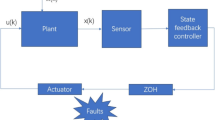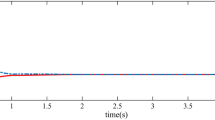Abstract
This paper deals with the problems of finite-time boundedness and dissipative analysis for a class of discrete-time nonlinear Markov jump systems (MJSs) with disturbances. In particular, the Takagi-Sugeno fuzzy model is applied to the nonlinear plant, and the impact of time-varying actuator saturation is considered in the controller design. The main purpose of this paper is to develop a mode-dependent fuzzy saturation control for fuzzy MJSs over a finite-time interval. With the help of the Lyapunov stability theory and Abel lemma-based finite-sum inequality, it is established that convergence of all states are confirmed through the addressed control design. Correspondingly, the resulting closed-loop system is stochastically finite-time bounded and \(({\mathcal {Q}},{\mathcal {S}},{\mathcal {R}})\)-\(\gamma\)-dissipative under linear matrix inequality (LMI) framework. At last, two numerical examples are given to demonstrate the effectiveness and usefulness of the obtained LMI conditions.











Similar content being viewed by others
Explore related subjects
Discover the latest articles, news and stories from top researchers in related subjects.Data Availability
The authors confirm that the data supporting the findings of this study are available within the article and/or its supplementary materials.
References
Takagi, T., Sugeno, M.: Fuzzy identification of systems and its applications to modeling and control. IEEE Transactions on Systems Man and Cybernetics: Systems. 15, 116–132 (1985)
Wang, W., Huang, C., Lam, H.K., Wang, L.: Formation control of T-S fuzzy systems with event-triggered sampling scheme via membership function dependent approach. Information Sciences. 622, 842–858 (2023)
Kwon, O.M., Park, M.J., Park, J.H., Lee, S.M.: Improvement on the feasible region of H∞ performance and stability for systems with interval time-varying delays via augmented Lyapunov-Krasivskii functional. Journal of the Franklin Institute. 353, 4979–5000 (2016)
Lian, Z., Shi, P., Lim, C.C., Yuan, X.: Fuzzy-model-based lateral control for networked autonomous vehicle systems under hybrid cyber-attacks. IEEE Transactions on Cybernetics. 53(4), 2600–2609 (2023)
Park, M.J., Kwon, O.M.: Stability and stabilization of discrete-time T-S fuzzy systems with time-varying delay via Cauchy-Schwartz-based summation inequality. IEEE Transactions on Fuzzy Systems. 25(1), 128–140 (2017)
Shen, H., Su, L., Park, J.H.: Extended passive filtering for discrete-time singular Markov jump systems with time-varying delays. Signal Processing. 128, 68–77 (2016)
Tang, F., Wang, H., Chang, X.H., Zhang, L., Alharbi, K.H.: Dynamic event-triggered control for discrete-time nonlinear Markov jump systems using policy iteration-based adaptive dynamic programming. Nonlinear Analysis: Hybrid Systems. 49, 101338 (2023)
Li, F., Shen, H.: Asynchronous control of 2-D Markov jump systems subject to general probabilities information. Nonlinear Analysis: Hybrid Systems. 49, 101357 (2023)
Wang, G., Shan, H., Li, F., Wang, J.: H∞filtering for discrete-time hidden singular Markov jump systems subject to partially known probability information under DoS attacks. International Journal of Robust and Nonlinear Control. 33(5), 3210–3226 (2023)
Kavikumar, R., Sakthivel, R., Kwon, O.M., Kaviarasan, B.: Reliable non-fragile memory state feedback controller design for fuzzy Markov jump systems. Nonlinear Analysis: Hybrid Systems. 35, 100828 (2020)
Kong, L., Luo, M., Cheng, J., Wang, X., Shi, K.: Interval type-2 fuzzy dissipative control for multiagent systems with Markovian switching parameters via dynamic event-triggered and double-quantized schemes. International Journal of Fuzzy Systems. 25, 2020–2035 (2023)
Shen, H., Wu, J., Li, F., Chen, X., Wang, J.: Fuzzy multi-objective fault-tolerant control for nonlinear Markov jump singularly perturbed systems with persistent dwell-time switched transition probabilities. Fuzzy Sets and Systems. 452, 131–148 (2023)
Sun, Q., Ran, J., Fu, J.: Robust preview control of uncertain discrete-time T-S fuzzy Markovian jump systems subject to time-varying delays via sliding mode approach. Information Sciences. 639, 118980 (2023)
Wu, T., Xiong, L., Cao, J., Park, J.H.: Hidden Markov model-based asynchronous quantized sampled-data control for fuzzy nonlinear Markov jump systems. Fuzzy Sets and Systems. 432, 89–110 (2022)
Amato, F., Ariola, M., Dorato, P.: Finite-time control of linear systems subject to parametric uncertainties and disturbances. Automatica. 37(9), 1459–1463 (2001)
He, X., Li, X., Song, S.: Finite-time input-to-state stability of nonlinear impulsive systems. Automatica. 135, 109994 (2022)
Liu, X., Wei, X., Li, Y.: Observer-based finite-time fuzzy H∞ control for Markovian jump systems with time-delay and multiplicative noises. International Journal of Fuzzy Systems. 25, 1643–1655 (2023)
Qi, W., Zhang, C., Zong, G., Su, S.F., Chadli, M.: Finite-time event-triggered stabilization for discrete-time fuzzy Markov jump singularly perturbed systems. IEEE Transactions on Cybernetics. 53(7), 4511–4520 (2023)
Li, X., Yang, X., Song, S.: Lyapunov conditions for finite-time stability of time-varying time-delay systems. Automatica. 103, 135–140 (2019)
Li, X., Song, W., Li, Y., Tong, S.: Finite-time dynamic event-triggered fuzzy output fault-tolerant control for interval type-2 fuzzy systems. IEEE Transactions on Fuzzy Systems. 30(11), 4926–4938 (2022)
Wang, Y., Xu, S., Ahn, C.K.: Finite-time composite antidisturbance control for T-S fuzzy nonhomogeneous Markovian jump systems via asynchronous disturbance observer. IEEE Transactions on Fuzzy Systems. 30(11), 5051–5057 (2022)
Li, H., Wang, J., Shi, P.: Output-feedback based sliding mode control for fuzzy systems with actuator saturation. IEEE Transactions on Fuzzy Systems. 24(6), 1282–1293 (2016)
Ge, C., Zhang, Z., Wang, L., Liu, Y.: Novel stability criteria for sampled-data T-S fuzzy systems with actuator failure. International Journal of Fuzzy Systems. 25, 940–949 (2023)
Xie, Z., Wang, D., Wong, P.K., Li, W.: Dynamic-output-feedback based interval type-2 fuzzy control for nonlinear active suspension systems with actuator saturation and delay. Information Sciences. 607, 1174–1194 (2022)
Yan, S., Gu, Z., Park, J.H., Xie, X.: Distributed-delay-dependent stabilization for networked interval type-2 fuzzy systems with stochastic delay and actuator saturation. IEEE Transactions on Systems Man and Cybernetics: Systems. 53(5), 3165–3175 (2023)
Zhu, H., Li, X., Song, S.: Input-to-state stability of nonlinear impulsive systems subjects to actuator saturation and external disturbance. IEEE Transactions on Cybernetics. 53(1), 173–183 (2023)
Willems, J.C.: Dissipative dynamical systems part I: General theory. Archive for Rational Mechanics and Analysis. 45(5), 321–351 (1972)
Xie, S., Xie, L., Souza, C.E.D.: Robust dissipative control for linear systems with dissipative uncertainty. International Journal of Control. 70(2), 169–191 (1998)
Ma, Y., Jia, X., Liu, D.: Finite-time dissipative control for singular discrete-time Markovian jump systems with actuator saturation and partly unknown transition rates. Applied Mathematical Modelling. 53, 49–70 (2018)
Chen, G., Yang, J., Zhou, X.: Finite-time dissipative control for discrete-time stochastic delayed systems with Markovian switching and interval parameters. Communications in Nonlinear Science and Numerical Simulation. 110, 106352 (2022)
Ran, G., Shu, Z., Lam, H.K., Liu, J., Li, C.: Dissipative tracking control of nonlinear Markov jump systems with incomplete transition probabilities: A multiple-event-triggered approach. IEEE Transactions on Fuzzy Systems. 31(7), 2389–2400 (2023)
Tao, J., Lu, R., Shi, P., Su, H., Wu, Z.G.: Dissipativity-based reliable control for fuzzy Markov jump systems with actuator faults. IEEE Transactions on Cybernetics. 49, 2377–2388 (2017)
Zhang, X.M., Han, Q.L.: Abel lemma-based finite-sum inequality and its application to stability analysis for linear discrete time-delay systems. Automatica. 57, 199–202 (2015)
Acknowledgements
This work was supported in part by the Basic Science Research Program through the National Research Foundation of Korea (NRF) funded by the Ministry of Education under Grant NRF-2020R1A6A1A12047945.
Author information
Authors and Affiliations
Corresponding authors
Ethics declarations
Conflict of interest
No potential conflict of interest was reported by the authors.
Ethical Approval
This article does not contain any studies with human participants or animals performed by any authors.
Rights and permissions
Springer Nature or its licensor (e.g. a society or other partner) holds exclusive rights to this article under a publishing agreement with the author(s) or other rightsholder(s); author self-archiving of the accepted manuscript version of this article is solely governed by the terms of such publishing agreement and applicable law.
About this article
Cite this article
Kavikumar, R., Kaviarasan, B., Kwon, OM. et al. Dissipative Constraint-Based Saturation Control for Fuzzy Markov Jump Systems Within a Finite-Time Interval. Int. J. Fuzzy Syst. 27, 77–92 (2025). https://doi.org/10.1007/s40815-024-01761-9
Received:
Revised:
Accepted:
Published:
Issue Date:
DOI: https://doi.org/10.1007/s40815-024-01761-9




